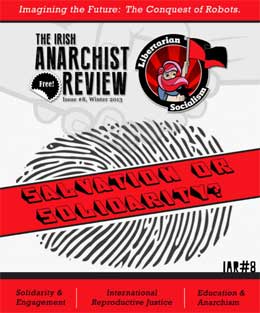Over 30 years of anarchist writing from Ireland listed under hundreds of topics
Review- Anarchy in a Cold War
 They say you can't judge a book by it's cover. The cover of the book, however, which has a picture of someone's buttocks with a circled A on one butt cheek and the squatter's symbol pretty much told me what was in store.
They say you can't judge a book by it's cover. The cover of the book, however, which has a picture of someone's buttocks with a circled A on one butt cheek and the squatter's symbol pretty much told me what was in store.
Anarchy in a Cold War is a novel about squatting in West Berlin during the early eighties, specifically 1981 and was actually written during that period. The novel is an attempt to give people a glimpse of what life as a squatter was like a city that came to symbolise the Cold War. It also became a city which attracted radicals, as it was also the only place in Germany, where men could go to to avoid conscription. The book focuses around a group of people who know each other and their different perspectives about the wave of squatting happening in Berlin and the repression against it.
The book has no clear plot, but we discover early on that there has been an upsurge of squatting in the last year in Berlin , in particular the area of Kreuzberg. Most people who have visited Berlin know that this area was where a big concentration of migrants lived, especially “Gastarbeiter” Turkish migrants who came over to work in Germany doing the menial jobs that no-one wanted. We learn in the book that there has been urban re-generation in Berlin so people on low incomes are forced to re-locate to that part of Berlin.
This book could have been an interesting and informative fictionalised piece about the squatting movement in Berlin at the time. On occasion it did have interesting tidbits, where magazine interviews or snippets of newspaper articles are worked in to give a better insight to the situation at hand or the author gave some background information, for example the formation of Berlin and the relationship this had to tenement buildings. This is probably one of its more redeeming features of the book. It feels that throughout the book we are simply watching a bunch of hedonistic youths partake in riots for the sake of it, where you are left with characters making statements such as “If you don't think that throwing stones at cops and smashing bank windows isn't serious, go out and do it yourself” and characters think it is perfectly reasonably to be drink alcohol during a protest, where you know more than likely there will be police repression.
Many of the characters do not seem actually to have any sort of established politics and just want to create a counter cultural area by squatting. One character talks jokingly about creating an “Anarchist Republic of Kreuzberg”, where the languages would be Turkish and the other “Szenedeutsch”, in which “Szene” is defined as “scene, subculture, as in 'die alternative Szene'”. The bar Spectrum, where a lot of the character spend their time is described as “the largest Freak watering hole around”, where Freak is defined as “a scene word, taken from the English, describing anyone alternative, hippyish, Punky, not deragatory.” They are proud of their lack of appeal to mainstream society and display a moralism against those who do not share their values.
Towards the end, we start to get to know a young single mother called Kalypso, who is introduced earlier on in the novel, but her character is never really explored. She is one of the more sympathetic characters in the book, she decides to squat because of the lack of housing options she has as a single mother and became political when she got pregnant, as part of the means of pulling herself together. I interpreted that getting involved in politics was her way of fighting to provide a better future for her child. She was a refreshing difference from the rest of the characters.
Another feature of the book which bothered me was the glorification of the riots and violence around the protest. It seemed to ignore the problem that can occur, when violence is sustained constantly throughout a campaign, which usually leads to burn out, especially when there does not seem to be a win in sight.
Overall, in my opinion, this book seemed like an adolescent exercise in hedonism where people with vague politics looked for any chance to have a drink including during a riot! It has certain redeeming features, highlighting the housing and migration issues in Berlin during that time. But if you are looking for a book to give you an insight on squatting in Berlin during the 1980s, I would search somewhere else.
WORDS: T.J.
Update: In August 2016 we were contacted to be told that "Anarchy in a Cold War, which you reviewed a while back, is now available free at the Internet Archive: https://archive.org/details/AnarchyInAColdWarKurtisSunday "

This article is from Irish Anarchist Review no 8 Autumn 2013



Comments
Book Review: Anarchy in a Cold War
What a lame review.
I'm surprised ... the book is actually quite historically accurate and has a strong satirical streak .... and doing well here in Berlin.
Harry Eden
Fucking great read
Brilliant narration of the squatting scene in Berlin in the tense years before the fall of the wall. Highly recommended as a racy introduction which transports the over digitised reader back into the exciting days before armchair revolution. A must-read!